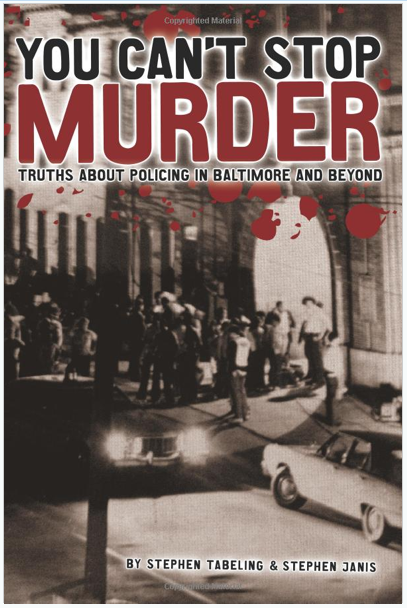
Stephen Tabeling’s ‘Book of Cop’ memoir, You Can’t Stop Mur- der, was co-written by WBFF Fox45-TV Producer Stephen Janis and published by Baltimore True Crime, in association with Voice of Baltimore as editor. The ‘Good Friday Shooting’ perpetrated by then-18-year-old John Earl Williams is chronicled in the book.
TOSSES OUT HIS CONVICTION
John Earl Williams fired from 3rd floor window
at Lombard and Carey Sts. in West Baltimore,
killing one police officer, wounding 6 others
CHRONICLED IN YOU CAN’T STOP MURDER
UPDATE (Sunday, Nov. 3): The Baltimore State’s Attorney’s Office, which had erro- neously told Voice of Baltimore’s media partner WBFF Fox45-TV late Thursday that John Earl Williams was ineligible for either a new trial or release under the Unger decision, reversed its denial Saturday, acknowledging that the ‘Good Friday Shooter’ is in fact eligible to cut a deal and be released into the community or be retried for murder.
By Alan Z. Forman
The teenage sniper who shot seven cops — killing one — from his third floor window in a West Baltimore row home in 1976 has had his conviction overturned and will likely be getting a new trial.
Four days after a lone gunman shot and killed a Baltimore City councilman and wounded two others in a botched attempt to kill then-Mayor William Donald Schaefer, John Earl Williams recorded an audio tape, telephoned the Baltimore Police Department, told a dispatcher what he was about to do, and then began shooting the city’s finest near his home at the corner of Lombard and Carey Streets.
Known as The Good Friday Shooter, his rampage took place on April 16, 1976. Now well into his fifties, Williams, 18, was trying to impress a young girlfriend who had just dumped him.
The event is chronicled in a new book by the now-retired detective who covered both cases, co-published by Baltimore True Crime in association with Voice of Baltimore and co-written by WBFF Fox45-TV Investigative Producer Stephen Janis, entitled You Can’t Stop Murder.
The detective is former Baltimore City Police Lieutenant Stephen Tabeling, 84, who led the Homicide Division then and has been involved in training cops ever since.
Williams was convicted and sent to prison for life plus 90 years, but because of a Maryland Court of Appeals decision last year that in cases tried before 1980, judges gave juries bad instructions, he will more than likely be retried for his crime.
Known as the “Unger decision,” the high court’s ruling came in the case of Merle Unger Jr., who was sentenced to life in prison for shooting and killing a Hagerstown police officer who interrupted a holdup he was committing in 1975.
The judge in Unger’s trial told jurors that his instructions about the law were “merely advisory,” thereby allowing the jury to disregard the defendant’s rights, the Court of Appeals ruled in May 2012.
UNGER RETRIED AND CONVICTED A SECOND TIME
Unger was scheduled for re-sentencing this month, after having been retried and convicted a second time.
Extrapolated to the Williams case, according to the high court’s ruling the jury could have ignored the presumption of innocence — that is a foundation of American jurisprudence — and found him guilty without proof beyond a reasonable doubt.
Some 200 Maryland felons who are still serving prison sentences could end up free under the ruling, about half of whom committed their crimes and were convicted and sentenced in Baltimore City.
A dozen or more who are eligible for either retrial or release under the Unger decision were convicted in Baltimore County.
Judge Barry Williams has been assigned the task of adjudicating which felons in the city are to be retried and which ones will be set free. In many cases however there are no longer any living eyewitnesses to testify to the felons’ guilt.
As of late August, about two dozen had so far been released statewide. In the city, a courthouse official told Voice of Baltimore Thursday that at least 25 had been released by the Baltimore judicial system since that time.
Regarding the Good Friday Shooter, the official said it was “unlikely” the court would cut Williams a deal and release him. “The case is really too egregious,” the official said, despite the fact he’s been a “model prisoner, making furniture for sale to state agencies.”
LIVE WITNESSES STILL AROUND?
“But in other cases, who knows how many live witnesses are still around?”
Williams is now 55 and has been in jail for more than 37 years. The courthouse official acknowledged having looked him up after reading about the Good Friday shooting in You Can’t Stop Murder.
Despite the fact that many of the others who cut deals and have been released spent less time in jail than Williams, the official said it would be a “big surprise” if City State’s Attorney Gregg Bernstein were to decide not to retry him.
And former Lieutenant Tabeling told VoB, “Absolutely, he should be retried,” adding that there were ample witnesses and evidence available to obtain a conviction.
Williams “made an audio tape,” he noted, in which he threatened “to start offing pigs in West Baltimore,” just prior to going on his Good Friday rampage, and which could be used to help convict him again at retrial.
“It was one of most emotional times ever in the Baltimore Police Department,” Tabeling recalled.
“Several of the men involved left the job because they didn’t want to tolerate that kind of thing any more.”
ONE OF THE LAST OFFICERS SHOT AT
Patrolman Alan Small, a State of Maryland auditor, now 60, was one of the last of the officers shot-at that Good Friday, to leave the department.
A Baltimore native, he had been on the force only three years in 1976, when he was one of the first officers on the scene at Lombard and Carey, the location of Williams’ massacre.
“I was having lunch,” Small remembered, “sitting in a parking lot six blocks away eating half a shrimp sub — it was Good Friday, and being Catholic I couldn’t eat meat — when the call came out, a citywide alert: ‘Officer under fire at Lombard and Carey Streets.’”
Small stopped his car at Baltimore and Carey, and with two other officers ran south toward Lombard. “As we were running past the fire house, that’s when he [Williams] opened fire, and we were ducking behind cars,” he said.
Patrol Officer Jimmy Holcombe, 31, the lone policeman killed that day, was on Small’s right when he was fatally shot. On Small’s left was Detective James Brennan, who was felled by two shotgun wounds to the arm and side, and who was bleeding profusely.
Through it all, however, “we all kept level heads back there,” Small said, attributing the professionalism of the officers on the scene to the “discipline we received in the [Police] Academy: How to work in a unified command under extreme pressure.”
FORTUNATE TO HAVE LIVED THROUGH IT
“Otherwise there’s the possibility none of us could have walked away that day. I consider myself very fortunate to have lived through it.
“But the memories will be forever embedded in my mind.”
The fate of Williams and other Baltimore City felons subject to the Unger decision — whether to give them a new trial, or cut a deal releasing them immediately into the community — will be decided by Judge Williams at a hearing scheduled for Nov. 14.
Until then, the judge has declined to release the names of the incarcerated persons under consideration.
“Although we tend to put incidents like that behind us,” Small told VoB, “the recollections of that Good Friday will always press upon my mind.
“What occurred on that day was complete disrespect for the badge that every police officer carried.”
A spokesman for the State’s Attorney’s Office told Voice of Baltimore’s media partner, WBFF Fox45-TV that Williams is not subject to the Unger decision.
However VoB’s courthouse source confirms that his case is under consideration and that he is one of the felons whose fate will be decided at the Nov. 14 hearing.
alforman@voiceofbaltimore.org
EDITOR’S NOTE:
Janis and Tabeling’s “Book of Cop,” You Can’t Stop Murder — published by Baltimore True Crime, in association with Voice of Baltimore — was edited by VoB Managing Editor AL Forman and co-edited by Taya M. Graham, with assistance from former Baltimore Sun editor and rewrite man David M. Ettlin. It is available for purchase from Amazon at http://www.amazon.com/You-Cant-Stop-Murder-Baltimore/dp/1491009772.
Excerpts on VoB may be found under the title, Black October and the Murder of Turk Scott by clicking here, here and here.






November 1st, 2013 - 12:49 AM
[…] Read More at: Voice of Baltimore […]
November 3rd, 2013 - 10:01 AM
[…] READ VOICE OF BALTIMORE’S THURSDAY STORY ON DETECTIVE TABELING AND THE UNGER DECISION: click here Filed under: Top Stories Comment […]
August 14th, 2017 - 5:14 PM
Hello admin i see you don’t monetize your website. You can earn additional
money easily, search on youtube for: how to earn selling articles